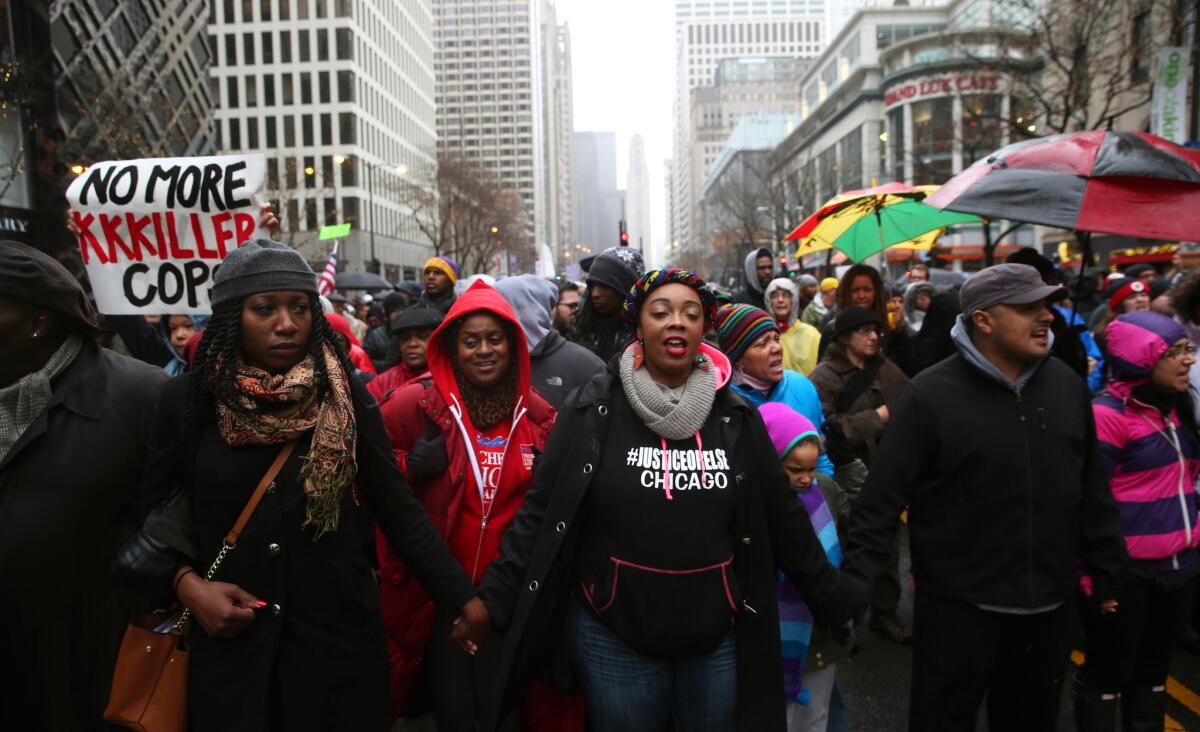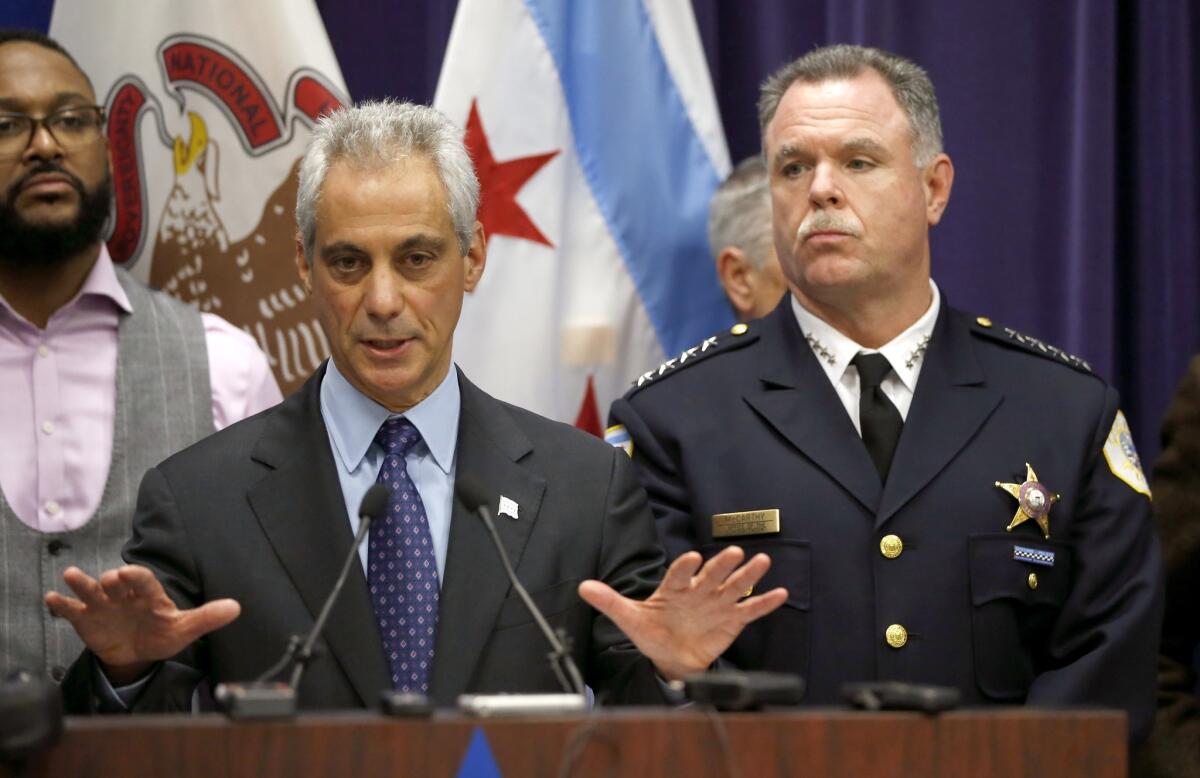Ex-Chicago police superintendent breaks silence on Laquan McDonald case: ‘Someone had to take the fall’
In his first public remarks since the Laquan McDonald controversy cost him his job as Chicago police superintendent, Garry McCarthy distanced himself from any responsibility in the handling of the fatal police shooting, saying that by law his only role was to strip the officer of his police powers.
During a panel discussion on policing earlier this week at Harvard University, McCarthy said he viewed the video of Officer Jason Van Dyke shooting the black teen 16 times on the day after the Oct. 20, 2014, incident.
“That was the end of my involvement until the Independent Police Review Authority recommended that I take the only disciplinary step that I could take by Illinois state law, which is to strip that officer of his police authority, which I did immediately,” he said Tuesday, according to a recording of his appearance. “After that, I was completely not involved in it.”

People gather during a demonstration in Chicago on Nov. 27, 2015, after the release of a police video showing an officer fatally shooting Laquan McDonald.
McCarthy portrayed himself as a victim in the fallout after the court-ordered release of the disturbing video in late November, saying “somebody had to take the fall.”
He then shrugged his shoulders, raised his right hand into the air and declared, “Hi,” drawing some laughter from the crowd.
Speaking at Harvard’s John F. Kennedy School of Government, McCarthy also suggested that his departure was a factor in the seemingly out-of-control violence plaguing Chicago, particularly so far this year, saying the city is “in a world of mess right now.”

Chicago Mayor Rahm Emanuel and then-Police Superintendent Garry McCarthy appear at a news conference in Chicago on Nov. 24, 2015, announcing first-degree murder charges against Officer Jason Van Dyke in the death of Laquan McDonald.
He had earlier painted a glowing picture of his performance as superintendent, citing an overall 40% reduction in crime during his 4 1/2 years in office, the lowest homicide totals in 2013 and 2014 since the mid-1960s, a 50% reduction in complaints against officers and a 68% drop in police shootings.
But he failed to note the dramatic rise in homicides in 2015 or that shootings had risen sharply for two consecutive years before his departure.
Saying communities across the country want civilian oversight of police departments and independent investigations of police shootings, McCarthy noted that “Chicago has that.”
But he then pointed out that during his tenure, the Chicago Police Board overruled three-fourths of his recommendations to fire officers.
He made no mention, however, of the controversy over the effectiveness of the Independent Police Review Authority, which investigates police shootings in Chicago. A Tribune examination found that since its formation in September 2007, the IPRA has found officers at fault in only two of 409 shootings -- and both were off-duty incidents.
McCarthy had attained a high profile as police superintendent, particularly after he battled NATO protesters on the frontline with rank-and-file cops in 2012, but since his firing by Mayor Rahm Emanuel, he has all but disappeared from public view while declining to comment to the news media on his dismissal.
In firing McCarthy on Dec. 1, the mayor had said that “the public trust in the leadership of the department has been shaken and eroded.”
But in the months since then, McCarthy said, he hasn’t heard a negative word in his contacts with the public.
“I have gotten universal support from every single person -- black, white, green, purple -- across the city,” he said. “Everybody who I’ve run into, not one person has said anything negative to me.
“So the progress was being made. Right now we’ve got a 120% increase in the murder rate in the city of Chicago. And you know, there’s consequences for everything.
“And whether it’s my firing or whether it’s the police officers who now feel -- my colleagues across the country ... say things to me like, ‘Well, Garry, if they got you and you are one of the most progressive, reform-minded police leaders in the country, then they can get any one of us.’ And then police officers in Chicago are saying the same thing to me, which is, ‘If that’s how you were treated, what would they do to me?’ ... And how do I juxtapose these two positions? So we’re in a world of mess right now in Chicago.”
McCarthy said he’s frequently told by people in Chicago, “You got screwed, but somebody had to take the hit.”
“At the end of the day, police legitimacy in Chicago took an enormous hit, and people are dying at record numbers right now as a result,” he continued. “There’s a consequence for that. We have to recognize that if we don’t like the way the system works, change the system, right? I described to you all the things that people wanted from police oversight, and outside investigatory agencies exist [in Chicago], and at the end of the day they didn’t like the results. And somebody had to take the fall and somebody had to take the hit.”
Twitter @JeremyGorner
More to Read
Start your day right
Sign up for Essential California for news, features and recommendations from the L.A. Times and beyond in your inbox six days a week.
You may occasionally receive promotional content from the Los Angeles Times.






